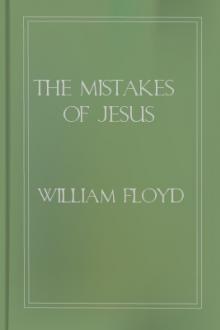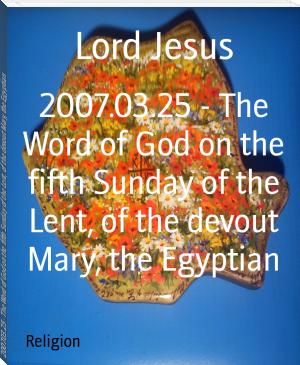The Mistakes of Jesus - William Floyd (warren buffett book recommendations .TXT) 📗

- Author: William Floyd
- Performer: -
Book online «The Mistakes of Jesus - William Floyd (warren buffett book recommendations .TXT) 📗». Author William Floyd
The Project Gutenberg EBook of The Mistakes of Jesus, by William Floyd
This eBook is for the use of anyone anywhere at no cost and with
almost no restrictions whatsoever. You may copy it, give it away or
re-use it under the terms of the Project Gutenberg License included
with this eBook or online at www.gutenberg.org
Title: The Mistakes of Jesus
Author: William Floyd
Release Date: October 11, 2007 [EBook #22955]
Language: English
*** START OF THIS PROJECT GUTENBERG EBOOK THE MISTAKES OF JESUS ***
Produced by Marilynda Fraser-Cunliffe, Stephen Blundell
and the Online Distributed Proofreading Team at
http://www.pgdp.net
THE MISTAKES
OF JESUS
BY
WILLIAM FLOYDAuthor of "Social Progress,"
"People vs. Wall Street,"
"Our Gods on Trial,"
"War Resistance."
New York
THE FREETHOUGHT PRESS ASSOCIATION.
Copyright 1932 By
THE FREETHOUGHT PRESS ASSN., INC.
TO DEVOTEES
OF TRUTH
Transcriber's Note
Minor typographical errors have been corrected without note. Archaic spellings have been retained. Paragraph spacing has been normalised.
A table of contents, though not present in the original publication, has been provided below:
FOREWORD Face the Facts. The True Jesus. Scriptures Unauthentic. Faith in Jesus. Documentary Evidence. Retain the Good. Christianity Must Go. ANTIQUATED THEOLOGY The Virgin Birth. The Jewish Messiah. Eternal Damnation. The Atonement. Angels and Devils. FALSE IMPRESSIONS Jonah and the Whale. End of the World. Miracles. Eternal Life. Raising Lazarus. God's Protection. Belief in Prayer. OBSCURE TEACHINGS Witnesses and Judge. Cannibalism. Religion Only for Children. Difficult or Easy? Charity. The Scriptures Upheld. Illogical. Parables Deceptive. DEFICIENT INSTRUCTIONS Labor. Usury. Economics. Punishment for Debts. Healing. Peace. Marriage. Celibacy. Adultery. Divorce. Faulty Judgment. Unconvincing. Prohibition. Lack of Experience. AN INFERIOR PROTOTYPE Cursing Nature. Forgiveness. Vituperation. Destruction of Property. Egotism. Lack of Courtesy. Unethical Advice. Sermon on the Mount. Inconsistency. Fear. Failure. CONCLUSION Jesus a Myth. Judged by His Works. Ethical Evolution. Gains, not Losses. CODE OF LIVING FOREWORDThe tradition regarding Jesus is so glamorous that it is difficult to review his life and character with an unbiased mind. While Fundamentalists and Modernists differ regarding the divinity of Christ, all Christians and many non-Christians still cling to preconceived notions of the perfection of Jesus. He alone among men is revered as all-loving, omniscient, faultless—an unparalleled model for mankind.
This convention of the impeccability of Jesus is so firmly established that any insinuation of error on his part is deemed a blasphemy. Doubting Jesus is more impious than mocking God Almighty. Jehovah may be exposed to some extent with impunity; a God who destroyed 70,000 of his chosen people because their king took a census[1] is too illogical for any but theologians to worship. But the Son of God, or Son of man, is sacrosanct. Jesus is reverenced as the one man who has lived unspotted by the world, free from human foibles, able to redeem mankind by his example.
Respect for the principles of Jesus is so inbred in American people of all faiths that an attempt to disparage his worth is denounced as bad taste. The detractor is suspected of being an immoral person, no matter how convincing may be the proof which he presents. A conspiracy of silence is directed against any system of ethics advanced as superior to the Sermon on the Mount. In popular opinion Jesus never made a mistake; all his teachings were infallible; no other view is tolerated.
Face the Facts
This unwillingness to acknowledge the shortcomings of Jesus is partially due to fear of sustaining a great loss. The familiar answer to heretical arguments is that faith should not be destroyed unless something can be put in its place—ignoring the fact that something always may be substituted for beliefs destroyed. That substitute is faith in the world as it really is. And our modern world, with all its shortcomings, is infinitely preferable to the earth, or even the heaven, of the first century. We now know that man can do more to eradicate sorrow than Jesus ever thought of. We can have greater confidence in the world as revealed today than in the doubtful traditions of Biblical times.
But suppose there were nothing to substitute for the myth destroyed, should that deter the Truthseeker from continuing his investigation? Scientists do not hesitate in their research because the result of a new discovery may be disastrous. They seek the facts regardless of consequences; they want to know the Truth about the physical world. Ethicists should have a similar desire concerning the metaphysical world. They should have confidence that the Supreme Intelligence (as Edison called it) will lead on to better things.
The True Jesus
If Jesus was what his followers believe, no arguments will destroy their faith in him; but if Jesus was not perfect, according to modern standards, it is important that his status as God, or man, should be revised. Loss of confidence in an erring idol is not loss of a true ideal.
When an iconoclast asserts that Jesus lacked supreme intelligence, the natural question is, "How do you know that you are right in your appraisal, 'lest haply ye be found even to fight against God'?" The answer is that we do not claim omniscience, but merely request everyone to use his or her own judgment, with intellectual honesty, examining each act or saying of Jesus without regard to presupposed ideas or tradition.
Scriptures Unauthentic
The consensus of scholarship has rejected the creation of the universe in six days in 4004 b.c., science having proved the existence of the world for millions of years. Higher Critics refuse to credit the book of Genesis, according to the first chapter of which the trees, beasts and fowls were created before man, but according to the second chapter after man. It is not assuming too much for the humblest writer to say that Moses was mistaken concerning many things he described in the Pentateuch. It follows that if one important portion of the Bible is untrustworthy, other parts of that same book may not be the infallible Word of God. The New Testament, as well as the Old, may be examined critically, and if the gospels contain numerous contradictions, the statements of the authors on any point, including the life of Jesus, are open to question. A conscientious person should reach conclusions based upon the best knowledge obtainable from all sources.
If anyone is convinced that Jesus made mistakes, he is not necessarily compelled to become an atheist. All other Gods that have been worshipped by men have been found imperfect. The oft exposed errors of Jehovah do not prevent Christians and Jews from professing belief in God. Those who require support from outside themselves cling to the symbol of deity though not thoroughly crediting any personality ever described in any sacred scriptures. Except Jesus.
An Evolutionist passes beyond the negative denial of God to the construction of a new philosophy in which Truth is his guide, Truth being the nearest approximation to reality obtainable with our present knowledge. Belief in the world as it is now, and as it is going to be, is a sufficient creed.
Faith in Jesus
With Jesus entrenched in popular opinion, there is small probability that faith in him will be shaken unless there is a preponderance of evidence against his divinity. No one need abandon faith in Jesus until convinced that something better has been found. No one should even expose himself to heretical arguments unless he is a devotee of Truth. Then only can he rejoice at a revelation of error in confidence that the more nearly the universe is understood the better can man adjust himself to his surroundings. A worshipper of Truth fears no destruction of false gods, nor any facts that may cause him to throw over treasured superstitions. He is willing to prove all things and hold fast to that which is true. He rejoices when his idol is shattered, knowing that he is approaching nearer to the true way of living, a way that Jesus did not adequately explain.
Any attempt to censure the character of Jesus will meet with the ridicule it deserves unless substantiated by documentary evidence. The mere improbability of events contrary to natural laws does not destroy the ethical value of the teachings of the Nazarene. Anything might have happened in the eerie days of old; the critic must do more than deny the historicity of Jesus and the inspiration of the Bible. To be convincing he must derive from the scriptures in which Christians believe whatever proof can be deduced to unveil the superstition of a redeeming Savior.
Documentary Evidence
The documents most generally accepted by Christians are those collected in the King James Version of the Bible. The Apocrypha and other early manuscripts are unreliable. None of the thirty or more writers who described events around Jerusalem in Jesus' time gives any account of his teachings. The only life of Jesus is found in the four gospels; the numerous biographers of Christ have had no other reliable source of information. It is deceptive for the publishers of revised editions of the Bible to claim that "original manuscripts" have been consulted. Not one of the original manuscripts is in existence, the earliest extant dating from the fourth century a.d., while the most ancient portion of the New Testament in any museum was transcribed in the sixth century.
Accepting, therefore, the King James Version of the New Testament as the most reliable source of information, the question arises as to what portion of the chapters therein may be considered authentic. Scholars have rejected the entire gospel of John as less reliable than the synoptic gospels; and the sixteenth chapter of Mark as an addition after the original papyrus had broken off. Modernists, being confronted, in spite of these deletions, with inconsistencies in the gospels of Matthew, Mark and Luke, have assumed the further privilege of rejecting any verses which appear at variance with their beliefs. Liberals of this class contend that the supernatural side of Jesus may be disregarded and yet that Jesus will remain Our Lord. They reject certain evangelistic passages that conflict with modern thought, but accept other statements by the same authors as authoritative.
As the Christian churches have not accepted any abbreviation of the Bible as a substitute for the King James Version, it seems proper for the critic to have recourse to that translation as the most authentic description of the life and teachings of Jesus. He is justified, moreover, in considering every word in the supposedly inspired gospels as equally reliable. His only concern should be to interpret each verse as nearly as possible as the original writers intended their words to be understood, allowing for Eastern hyperbole and the custom of the times.
Retain the Good
In preparing a critical analysis of the character of Jesus, it is freely admitted that many of the thoughts





Comments (0)